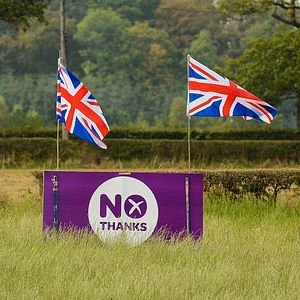What does an independence referendum in Scotland have to do with China? Nothing, according to the Foreign Ministry, where spokespeople repeatedly refused to comment on “the domestic affair of the UK.” But Chinese citizens were all too happy to comment on the referendum, as David Wertime of Tea Leaf Nation outlines. The Scottish referendum, coming amidst a growing protest movement in Hong Kong, inspired comparisons between Scotland and Hong Kong. Online commenters were split on the basic idea of an independence referendum — “What’s so wrong with splitting up?” one asked, while others warned that legitimizing separatist movements was an inherent danger of democracy. The Chinese government considers separatism as one of the “three evil forces,” along with terrorism and extremism.
The Scottish referendum also attracted attention in Taiwan, where the idea of putting Taiwanese independence to a vote has occasionally surfaced (always provoking an angry response from the mainland). Taiwan’s premier, Jiang Yi-huah, said that the government will not hold a referendum on the issue. Taiwan’s CNA paraphrased Jiang’s explanation: “Unlike Scotland, the Republic of China (Taiwan) is an independent and sovereign state, and there is no reason to announce independence or decide to separate from another nation.”
In other news, the New York Times’ Austin Ramzy noted growing pressure on China to be more active in helping contain the Ebola epidemic in western Africa. Given China’s extensive investments in Africa, as well as its status as the world’s second largest economy, many were clamoring for Beijing to increase its aid to the affected nations of Guinea, Liberia, and Sierra Leone.
Beijing responded this week by announcing a new aid package worth 200 million RMB ($32.5 million) for affected countries. Xinhua notes that the announcement was made by Xi Jinping during his trip to India. The aid includes cash as well as food and materials. $2 million each will be given directly to the World Health Organization and the African Union.
Earlier this week, I looked at South Korean media reports indicating that Kim Jong-un might soon pay a visit to China. The Chinese-language Global Times has denied the reports — their article accused South Korea media (notably, Yonhap News Agency) of “misreading” or “deliberately hyping up” the ambassador’s comments. The article said that Global Times reporters, after “going through the relevant channels,” understood that the ambassador “never said Kim Jong-un was about to visit China.”
Finally, the Wall Street Journal takes a look at the worst polluter in China’s smoggiest city. Jizhong Energy Resources Co. operates “six large coal mines and dozens of related facilities” in Xingtai, a coal-mining area with the unwelcome distinction of being China’s most polluted city. Under pressure to clean up its act, Jizhong will close three of its five power plants in Xingtai, with plans to reduce emissions at a fourth plant. The WSJ piece highlights the difficulty of China’s environmental problem — while some residents in Xingtai are happy to see Jizhong decrease pollution, others are upset about falling wages and the possibility of lost jobs. Jizhong is undoubtedly one of the worst polluters in the area (five of its plant are on the national government’s list of worst air polluters) but it is also crucial to the local economy. The company employs over 50,000 people and last year paid over 1 billion RMB in taxes to the local government. While a new survey indicates that 56 percent of Chinese prioritize the environment over economic growth, it’s unclear if China’s local governments share that perception.
































